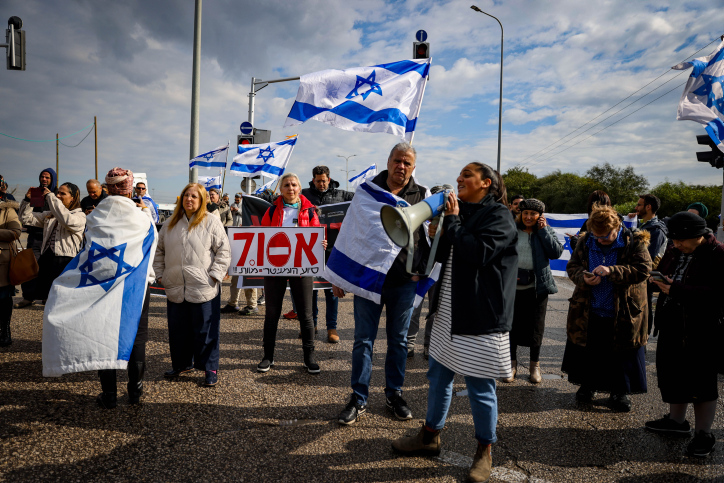Yehuda Dee, whose mother and sisters were murdered by terrorists, among 30 protesters arrested why blocking aid to Gaza.
By Batya Jerenberg, World Israel News
Rabbi Leo Dee’s son was among 30 protestors arrested Wednesday trying to block aid trucks from entering the Gaza Strip through the Kerem Shalom crossing as the IDF hardened its stance towards those acting on their belief that Hamas needs a stick instead of a carrot to release the hostages they have been holding since its October 7, 2023 invasion of Israel.
Dee, whose wife Lucy, and two daughters, Maya (20) and Rina (15) were murdered by Palestinian terrorists last April and was subsequently appointed as the Foreign Ministry’s Special Envoy for Social Initiatives, said he fully supported his son’s actions.
“I am so proud that my 15-year-old son, Yehuda, is doing what he can to help the families of the hostages,” he wrote in an op-ed in Ynet afterwards.
Calling for “all Israeli high school kids to come, next week, to Kerem Shalom to block the food trucks,” he said that this would be a better tactic than a reported deal to halt the war for “two months” and free “thousands of terrorists from Israeli jails” in exchange for a phased release of 136 remaining hostages, including 29 who were murdered or died from lack of medical care in Hamas captivity.
Dee echoed the reasoning of the Tzav 9 grassroots group that began blocking the crossing a week ago, reducing the number of aid trucks getting through to single digits, before the entire area was declared a closed military zone Sunday afternoon and the numbers rose again to well over a hundred a day.
“What if regular Gazans began to reveal the locations of our hostages under fear of their own starvation? What if this could save hundreds of lives of our soldiers who would be able to withdraw from Gazan territory?” he wrote, adding that this would save thousands of Palestinian lives as well, since the war would then end much more quickly.
Hundreds of activists, including members of the hostages’ families and of those killed in action in Gaza, and off-duty reservists, have come to protest throughout the week despite knowing they could be detained. On Monday, only four were arrested, but by Wednesday the number had shot up.
Those present complained that the police, who were there with a large force, including those on horseback, were using a great deal of undue violence against people who were only exercising their democratic right to protest and were not even near the crossing, having been blocked off several kilometers away. Video clips posted to X showed one mounted officer knocking a demonstrator to the ground in a field among dozens of other protestors.
The police claimed that those who were detained for questioning had been rioting and cursing at the security forces.
Protestors have also been arrested at the Nitzana crossing, the main land border crossing between Egypt and Israel for trucks carrying cargo between the two countries. Like at Kerem Shalom further to the north, aid trucks enter from Egypt to be inspected for illicit weaponry hidden among the food, fuel and other goods, before it is sent back to enter Gaza via the Rafah crossing.
The authorities began blocking the roads leading to Nitzana on Tuesday. The activists pointed out that this was an illegal prevention of their right to protest, as Southern Command head Maj. Gen. Yaron Finkelman signed the order declaring the whole area around Nitzana was also a closed military zone only on later that night.
The protestors have now turned to the justice system. On Wednesday, the Choosing Life Forum of bereaved families submitted a petition to the High Court of Justice against Finkelman, claiming that he issued his orders on both crossings for non-security reasons and to prevent a political protest.


